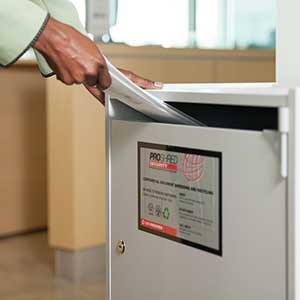May 9, 2019
Can I Shred My Old Tax Returns?
Now that tax season has come and gone and you’ve filed your return with your returns from past years, you may get the urge to purge. Here at Proshred® Conne
Do I need to keep tax returns from past years?
Yes! If there is a problem with your tax return, the IRS may ask you for more information or even perform an audit, and you will need to have the return in question, as well as all supporting documentation, available for review and to support and prove your case. You can even be selected for a random audit when there is no problem with your return, and having all your documentation in order will make the process relatively easy and painless.
How long do I need to keep tax returns?
The IRS recommends keeping copies of tax returns and supporting documents at least three years. Some documents, like real estate sales records or claims for a bad debt or securities loss, should be kept for seven years. If you do not file a tax return, under-report your income by more than 25%, or file a fraudulent tax return, the IRS has six years from the filing deadline for the year in question to go after you for unpaid taxes, so keep all documents for at least six years.
How long should I keep receipts and other documents related to my tax return?
The IRS recommends keeping records that support income, deductions or credits claimed on your tax return as long as you keep the tax return itself. Those documents include receipts, bills, canceled checks, legal papers, divorce settlements, custody agreements, criminal or civil defense papers, property acquisition documents, loan agreements, logs or diaries, tickets, medical and dental records, insurance documents and reports, theft or loss documentation, employment documents, and shareholder statements.
How should I store tax documents?
Your tax returns contain a great deal of personal and confidential information, including your Social Security number, financial records, and more, so it’s important to keep them stored safely and securely in a place that does not allow general access. The IRS suggests scanning paper tax and financial records into a format that can be encrypted and stored securely on a flash drive, CD or DVD along with photos or videos of valuables.
If the IRS deadline has passed, is it OK to shred my tax returns?
Not necessarily. The IRS recommends that before you discard any tax documents you check to make sure they will never be needed for other purposes. For example, you may still need documentation for insurance or creditors.
How should I get rid of old tax documents?
Once you’re sure you’ll no longer need tax documents, make sure you properly destroy them to prevent the information from being used by identity thieves. A professional shredding company like Proshred® Connecticut offers state-of-the-art shredding technology to make sure your personal information is completely and securely destroyed.
